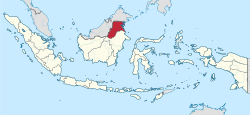Sultanate of Bulungan
| ﻛﺴﻠﺘﺎﻧﻦ بولوڠن | ||||||||||||||
| Kesultanan Bulungan | ||||||||||||||
| Part of Dutch East Indies (from 1880s) | ||||||||||||||
|
||||||||||||||
|
||||||||||||||
|
Map showing the present-day North Kalimantan province, which largely corresponds with the Bulungan Sultanate's territories under Dutch administration in 1930.
|
||||||||||||||
| Capital | Tanjung Palas | |||||||||||||
| Languages | Bulungan-Malay | |||||||||||||
| Religion | Sunni Islam | |||||||||||||
| Government | Monarchy | |||||||||||||
| History | ||||||||||||||
| • | Foundation | 1731 | ||||||||||||
| • | The Bultiken Revolution | 1964 | ||||||||||||
|
||||||||||||||
| Today part of |
|
|||||||||||||
The Sultanate of Bulungan was a princely state of Indonesia located in the existing Bulungan Regency in the North Kalimantan province of Indonesia in the east of the island of Borneo. With its territory spanning throughout the eastern shores of North Kalimantan and Tawau, Malaysia.
The Sultanate was founded by a Kayan group, the Uma Apan, who originated from the interior region of Apo Kayan (Kayan Highland Plateau), before settling near the coast in the 17th century. Around 1650, a princess of the group married a man from Brunei. This marriage founded a Hindu lineage who settled in the region of today's Tanjung Selor. Around 1750, this dynasty converted to Islam. Its rulers took the title of Sultan and were recognised as vassals of the sultan of Berau, the latter acknowledging himself a vassal of the kingdom of Kutai.
In 1850, the Dutch, who had conquered Berau in 1834 and imposed their sovereignty upon Kutai in 1848, signed with the Sultan of Bulungan a Politiek Contract. The Dutch intervened in the region to combat piracy and the trafficking in slaves.
Until 1860, Bulungan was a subject of the Tausug of the Sultanate of Sulu. During this period, vessels began travelling to Sulu, Tarakan, and thence into the interior of Bulungan, to trade directly with Tidung. This influence ended in 1878 with the signing of a treaty between the English and Spanish partitioning Sulu.
In 1881, the North Borneo Chartered Company was created, thereby placing northern Borneo under British jurisdiction, despite initial Dutch objections. The Sultanate was finally incorporated into the colonial empire of the Dutch East Indies in the 1880s. The Dutch installed a government post in 1893 in Tanjung Selor. In the 20th century, like many other princely states of the archipelago, the Sultan was forced to sign a Korte verklaring; a "short statement" in which he sold most of its powers over land upstream.
...
Wikipedia



